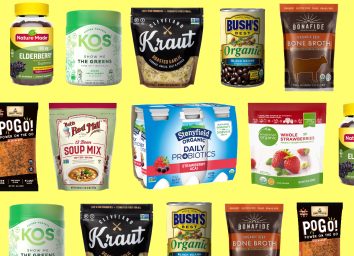Do You Need To Take Supplements During COVID-19?

The recent coronavirus pandemic has sent a shockwave through the lives of millions of people. While there have been many negative outcomes, one of the few benefits of the quarantine response is that it's pushed many people to re-evaluate their health and nutrition.
But if you're feeling stressed, you may not have the same mental energy to follow a balanced diet. As a result, you may be lacking certain nutrients in your coronavirus diet.
Or, if you're trying to be proactive about your health, you may be interested in adding foods to boost your immunity to your diet. For a quick fix, you may turn to the supplement aisle to get extra vitamins and nutrients in pill form. But can they actually help strengthen your immunity?
We asked a nutrition expert if it's worth it to take supplements to boost your immunity during the COVID-19 pandemic.
Will supplements boost your immune system?
"Many of the most popular dietary supplements Americans are purchasing right now in an attempt to support immune health have little research to back up such claims," says Julie Stefanski, MEd, RDN, registered dietitian nutritionist and spokesperson for the Academy of Nutrition & Dietetics.
And the research that supplements refer to for their health benefits isn't as conclusive as experts would like to see. "Studies with very few participants, too short a time frame, or that were completed with animals are often used to promote supplement claims," says Stefanski.
In short, experts generally recommend that you get nutrients from food, not supplements. And that goes for the coronavirus pandemic, as well.
How can you boost your immune system?
"While we can't actually boost our immune system to work harder than it naturally does, we can support its processes by including colorful vegetables at each meal," says Stefanski.
There are many ways you can do this using coronavirus pantry staples that will last for months:
- Eat more vitamin A and vitamin C. "Add some frozen spinach to your eggs or some extra carrots to your soup," says Stefanski. "When you get vitamin A and vitamin C, you get other vitamins and minerals too that work synergistically to support overall health."
- Get lots of fiber. "Vegetables and fruits also provide a natural source of fiber which is one of the best supporters of gut health. A significant portion of our immune system is contained with our intestines," says Stefanski. "Maintaining good digestive health by including high fiber foods such as beans, vegetables, fruits with seeds, and whole grains like oatmeal support our immune health better than some of the supplements for sale."
- Get more natural probiotics. "Including natural sources of probiotics such as those in yogurt or kefir in your daily diet is also a good way to get a wide variety of beneficial bacteria rather than just one particular strain found in a supplement," says Stefanski.
- Check your vitamin D levels, and consider a supplement. "This time of the year, without sufficient sunlight, it's hard to make enough vitamin D in the skin," says Stefanski. "Vitamin D food sources including egg yolks, fatty fish, and fortified dairy or dairy alternative products need to be consumed on a daily basis to keep up with vitamin D needs. It's best practice to check with your doctor or registered dietitian whether it's okay to begin a supplement. Based on your health conditions, your personal healthcare provider will know the right amount to prescribe."
RELATED: Click here for all of our latest coronavirus coverage.
You need to be wary of taking too much of certain vitamins
"Taking too much of any nutrient can do more harm than good. Nearly every vitamin and mineral has an upper limit (UL). Exceeding a recommended limit of a nutrient is typically not beneficial," says Stefasnki.
"If you're taking multiple products at the same time, there's the chance that you could be taking in more than what your body needs. Some dietary supplements contain mega doses that would never be found naturally in foods."
Enlist your health care professional to assess what you're taking and dosing. It's a smart and easy way to make sure you're taking adequate (and safe) amounts.
"When it comes to vitamins and minerals, groups such as children, pregnant women, and adults have different amounts that support health," says Stefanski.
Conclusion
It's important to keep in mind that the Food and Drug Administration (FDA) does not regulate dietary supplements. This leaves manufacturers with the task of ensuring its product contains what it claims without any real guidelines.
Because there are few studies to support supplement claims, it's best to follow a balanced diet during the quarantine.








